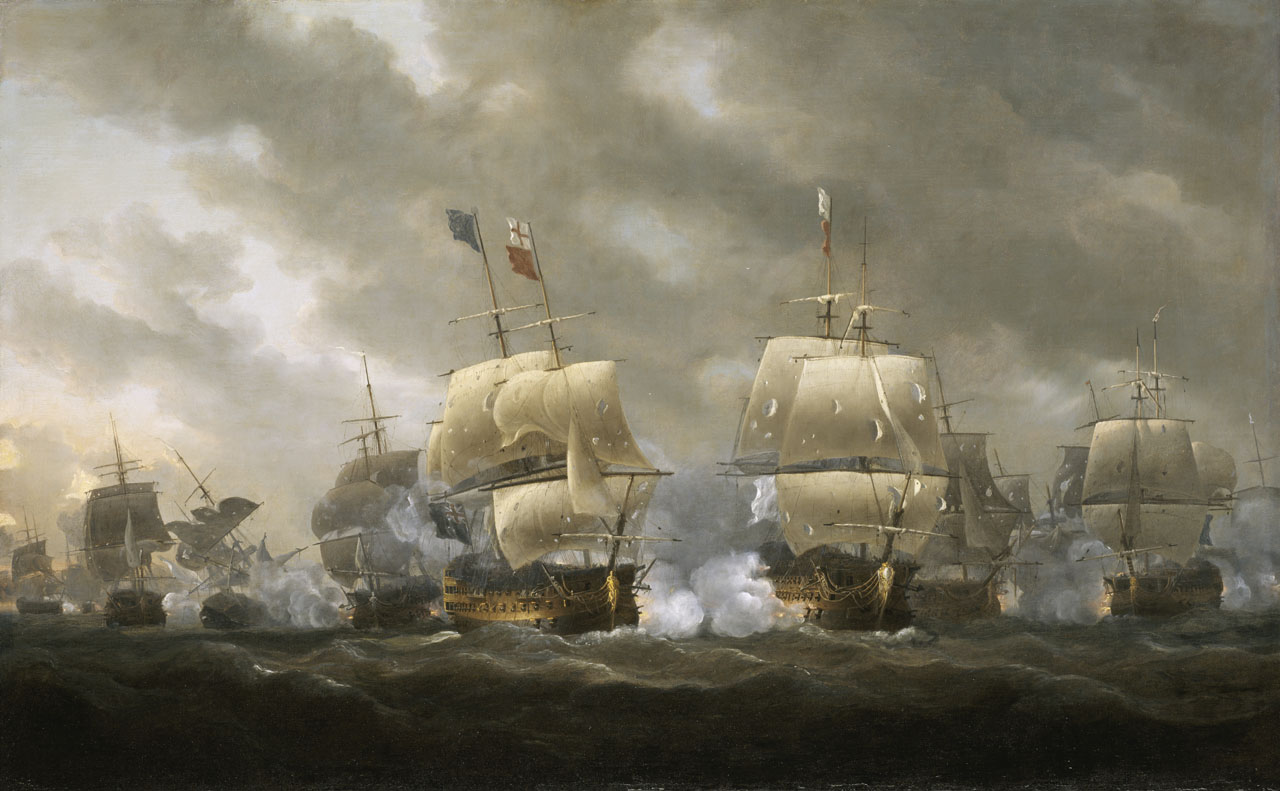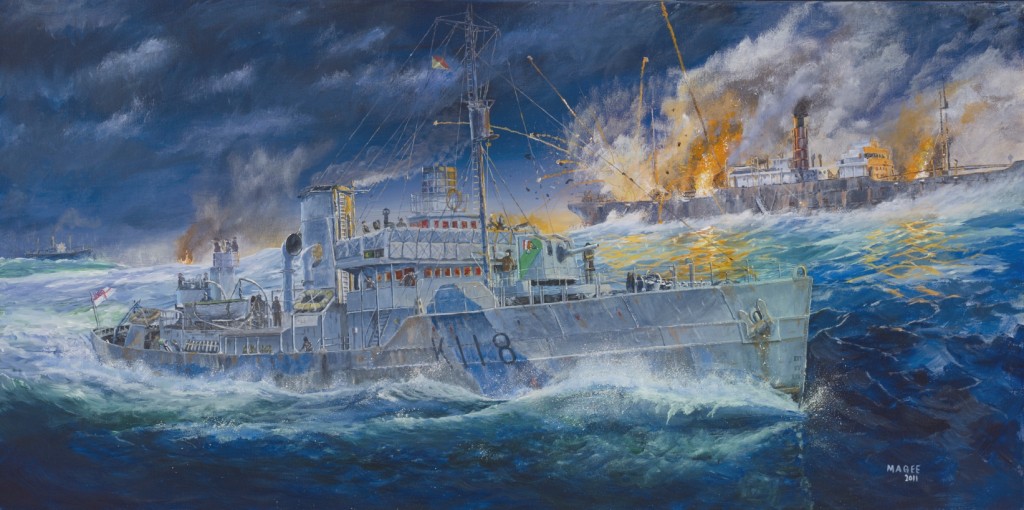
The Battle of Quiberon Bay off France’s South Brittany coast on Nov. 20, 1759, was the most decisive naval encounter during the Seven Years War, 1756-63. [N. Popcock/Royal Museums Greenwich]
Proponents of the politically correct and “anti-woke” traditionalists opposed to change all have their knickers in a knot over the impending demise of the Royal Canadian Navy’s official march song—which was never theirs to begin with.
“Heart of Oak,” a reference to the wooden ships of Britain’s 18th century Royal Navy, actually predates Canada’s swabbie service by more than 150 years.
It was written by William Boyce, an English composer, with words by an actor named David Garrick to celebrate British victories at Lagos, Quebec and Quiberon Bay, all of which took place in 1759—the Annus mirabilis, or “wonderful year.”
A few months later, in January 1760, there came the Battle of Wandiwash in India. Again, a British victory.
The fact is Canada’s navy never sailed a wooden warship. It never employed press gangs to crew its ships, either. The song references “Stout Britons,” “Britannia triumphant” and “Jolly Tars,” none of which are Canadian.
And, while they scored impressive points during the Battle of the Atlantic (1939-1945), RCN ships never “ruled the seas.” They can’t even rule the Northwest Passage.
The politically correct, who apparently include Lieutenant (N) Catherine Norris, former commanding officer of the Central Band of the Canadian Armed Forces, want the song gone because, as she claimed in a memo to navy brass, it’s not gender inclusive, it celebrates a colonial past and it references slavery.
The slave reference was originally written in the context of the press gangs that patrolled streets and pubs for 150 years between 1664 and 1830, pressing men into involuntary service aboard British navy ships. “To honour we call you,” went the song, “not press you like slaves. For whom are so free as the sons of the waves?”
Halifax had been a British naval base since its founding in 1749. Nova Scotians were subject to press gangs during the American Revolutionary War and the French Revolutionary and Napoleonic wars, but not by any Canadian navy.
After impressment was abandoned, the Brits changed the line to “Tis to honour we call you, as freemen not slaves,” echoing the refrain “Britons never will be slaves!” from the old standard, “Rule, Britannia!” The context had been changed, and in modern-day terms, the slave reference was complicated.

HMS Brisk captures the Spanish slaver Emanuela, formerly known as Sunny South, purported to be the fastest slave ship sailing out of Havana. Bound for Hong Kong under the Chilean flag, the ship had 846 slaves aboard when it was taken on Aug. 10, 1860.
[London Illustrated News/Arthur H. Clark Collection]
The Canadian version of the song has already been altered to address some other particularly Canadian concerns.
At the time the song was written, women aboard ships at sea were considered bad luck. Females have been serving on Canadian fighting ships (that is destroyers) since 1989 (the Brits didn’t permit women to serve aboard their warships until 1993).
To sing of sons and not daughters, especially in military service, seems rather unfair, doesn’t it?
The battles it celebrates, notes Norris, were all “British victories as part of colonial conquests including over the French colony of Canada.” That’s two colonial powers fighting over a colony. We now co-exist in peace with two official languages; the victory at Quebec is part of history, not something anglophones gloat over.
The Canadian version of the song has already been altered to address some other particularly Canadian concerns. The first of the lines “We never see the French but we wish them to stay, They always see us and they wish us away; If they run, we will follow,” was changed to “We ne’er see our foes, but we wish them to stay.”
Norris points out the Royal Navy had been involved in the slave trade, though Toronto Sun columnist Brian Lilly claims “the more important thing to note is that no organization on the planet did more to eradicate slavery than the Royal Navy after Britain abolished slavery.”
It’s true that the Royal Navy, West Africa Squadron, seized some 1,600 ships involved in the slave trade between 1807 and 1860, and freed 150,000 Africans destined for slave markets in the Americas.
But when slavery was thriving, it was the RN’s job to protect the national interest. It escorted slave ships down the African coast and fought major battles for control of the valuable “sugar islands” of the West Indies.
The Royal Navy even maintained its own enslaved Africans in its Jamaican and Antiguan dockyards. A few naval officers themselves owned plantations in the Americas. It was also not unknown for officers to have personal slaves aboard ship, although the practice was officially forbidden by the Admiralty.

HMCS Napanee, a Flower-class corvette, passes the torpedoed tanker Scottish Heather during the Battle for Convoy ONS 154. Forty-six merchant vessels under escort by six RCN ships were attacked by 23 U-boats during a seven-day running battle across the North Atlantic, beginning Dec. 26, 1942. Fourteen merchants were lost; 551 Canadian and Allied merchant sailors died; 564 were rescued. One U-boat was sunk.
[Marc Magee]
“Heart of Oak” is very ingrained in the RCN, unlike a lot of commands/branches/units who couldn’t name or hum their march.
By the time the slave trade was deemed illegal in 1807, as many as three million Africans had been transported in British ships since 1650. At the close of the 18th century, Britain was dominating the trade, with an average of more than 150 slave ships leaving Liverpool, Bristol and London each year.
A quarter of all Africans enslaved from 1500-1870 were transported across the Atlantic after 1807. It would ultimately take nearly 60 years of relentless diplomacy and naval patrolling to finally abolish the Atlantic slave trade.
“Heart of Oak” makes repeated reference to its sailors—males, all, according to the norms of the time it was written. They’re “men,” “boys,” “lads,” “sons of the waves.”
“The lyrics are not inclusive to all genders,” wrote Norris. “Heart of Oak is very ingrained in the RCN, unlike a lot of commands/branches/units who couldn’t name or hum their march.
“However, I think it is worth pointing out the hypocrisy of changing the ranks to be more inclusive while continuing to sing a March which isn’t.”
The traditionalists, including Lilly, of course call these politically correct points of view, which actually jibe with official military policy, “woke”—a bad thing, apparently.
“That’s rude & most definitely uncalled for,” a William Pratt wrote on Facebook, condemning talk of changing the song. “Some pecker head thinks he knows more than 10’s of 1000 RCN sailors.”
A right-wing Facebook page called “Proud To Be Canadian” posted a National Post column entitled “Navy brass need to stop worrying about microaggressions in song lyrics.”
“Is their any tradition that wokeism in Canada isn’t trying to destroy?” declared the unattributed poster. “Our sailors have been parading to ‘Heart of Oak’ for over 200 years.”
No, they have not. Not “our” sailors.
Rainbow—whose name might well draw the ire of the anti-woke crowd today—was the only major Canadian or British warship on the west coast of North America.
Canada’s navy came to be in 1910 as the Naval Service of Canada. King George V granted it royal sanction on Aug. 29, 1911, when it became known as the Royal Canadian Navy.
Its first ships were, ironically enough, two former Royal Navy vessels, Niobe and Rainbow, both protected cruisers—steel ships in less-than-desirable shape.
Rainbow—whose name might well draw the ire of the anti-woke crowd today—was the only major Canadian or British warship on the west coast of North America. The aged cruiser, commissioned in 1892 and bought by Canada for $225,000 (about $6 million in 2024), was taken out of service in 1917 and sold for scrap three years later.
Among its more notorious achievements: it escorted a shipload of aspiring Sikh immigrants—British subjects, no less—out of Vancouver harbour after they had been denied entry to Canada.
As a Canadian navy vessel, Niobe didn’t fare much better.
The ship ran aground in fog off Cape Sable, N.S., during a training cruise on the night of July 30-31, 1911. It was saved, but repairs took six months and its maximum speed was permanently reduced.
Niobe served First World War duty in the Gulf of St. Lawrence and along the eastern seaboard, but patrol work took its toll, and it began to wear out. The ship conducted a July 4-17, 1915, patrol and returned to Halifax where its funnels were found to be rapidly deteriorating, its boilers worn and bulkheads in poor shape.
Niobe was paid off Sept. 6, 1915, to become a depot ship in Halifax. Its final act of note was an ill-informed attempt to try to scuttle the flaming French munitions ship Mont-Blanc. The ship, already abandoned, blew up, killing 14 Niobe crew and damaging the Canadian vessel’s superstructure. It was sold for scrap in 1920.
Canada’s navy came into its own during WW II, spearheading the Allies’ war in the Northwest Atlantic.
The Royal Canadian Navy went on to bigger and better things—stuff worthy of its own song, one that pays homage to its RN roots, but elevates Canadian successes, neither “woke” nor whatever it is the anti-woke crowd profess to represent.
At the outbreak of the Second World War, the RCN had 11 combat vessels, 145 officers and 1,674 men. By 1945, it had the world’s fourth largest navy (not the biggest; not the “ruler of the seas”).
Its complement included two cruisers, 17 destroyers, 68 frigates, 112 corvettes, 67 minesweepers, 12 escort ships, 75 Fairmile motor launches, nine motor torpedo boats, and 12 armoured yachts, according to the Juno Beach Centre.
More than 96,000 men and 7,000 women had served in what is commonly called the senior service, even though the lineages of some Canadian army units date to the late 18th century.
Canada’s navy came into its own during WW II, spearheading the Allies’ war in the Northwest Atlantic. Its ships sank 31 U-boats and sank or captured 42 enemy surface vessels, while completing 25,343 convoy crossings. The RCN lost 33 ships and 1,797 sailors between 1939 and ’45.
Surely these feats and sacrifices are something to inspire Canadian sailors—French and English; women and men alike, regardless of race, religion or culture—not the exploits of British navies past.
Norris’ memo was sent four years ago. The navy has been considering it ever since and now appears set on change.
Besides that of the RN and RCN, “Heart of Oak” is the official march of the nine-ship Royal New Zealand Navy. It was the official march of the Royal Australian Navy until it changed songs six years ago, adopting Royal Australian Navy, which was written by Australian band leader Alex Lithgow in 1913.
“The Royal Canadian Navy has more pressing matters to concentrate on,” wrote Michael Higgins in an anti-woke diatribe for the National Post. “It was only last year that [Vice-Admiral Angus Topshee, RCN commander] said that the navy was in ‘critical shape’ with some occupations suffering shortages of 20 per cent.
“The navy’s Halifax-class frigates are at the end of their lives but will have to serve another 15 years because we can’t build ships fast enough,” Higgins continued. “Canada’s ageing, leaking submarines spend more time out of the water than in it.
“The navy’s new patrol ships have problems with significant flooding.”
Topshee has said that replacing “Heart of Oak” is not his most urgent priority. “Frankly,” wrote Higgins, “it shouldn’t even be on the agenda. Let’s get the ships fixed, the sailors hired and the woke nonsense sent to the bottom of the sea.”
No, let’s do it all. Let’s get our navy fixed and the song changed to something that better reflects Canada’s naval history and traditions. It’s not a case of either/or.
Advertisement





















